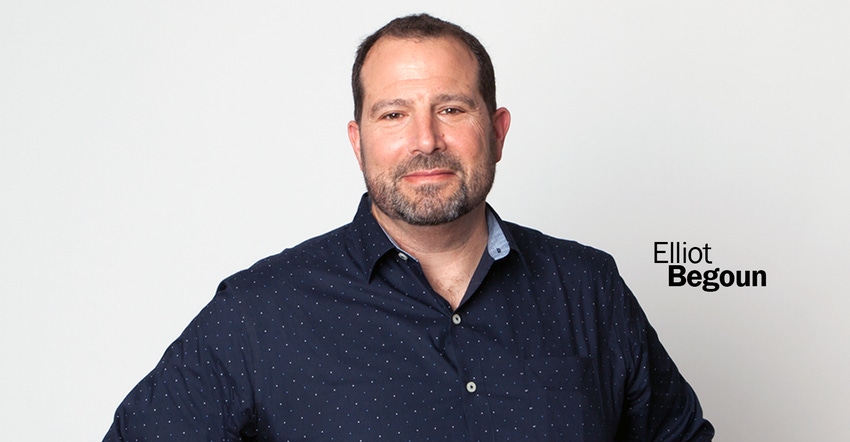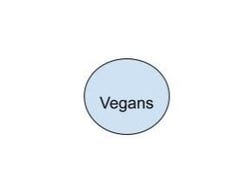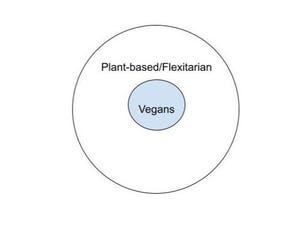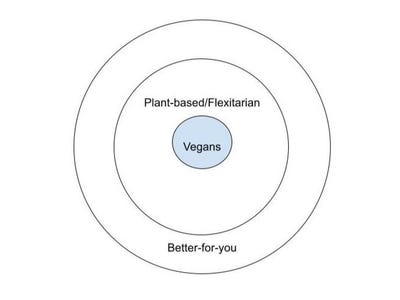The Tardigrade Circle Theory says no. Here's why.

I had a recent conversation with the co-founders of a brand. They were struggling with a tricky question. They were getting some product feedback from investors, industry insiders and consumers. It caused them to pause and ask if they should change the taste profile by adding some ingredients, even if it pulled them away from their core consumer. It’s a great question to ask and a hard one to answer. It allowed me to walk them through the Tardigrade Circle Theory, which I believe, for an emerging brand, is at the heart of a capital-efficient go-to-market strategy.
I will use the above conversation to illustrate this theory, walking you through an exercise that I hope proves helpful. I will anonymize it a bit to protect the innocent. If you want to play along at home, grab a blank piece of paper.
The above brand’s core consumers are whole food plant-exclusive eaters. In other words, people eating a healthy vegan diet. Those playing along at home, draw a small circle in the center of your page and label it Vegans.

This is a small, motivated, vocal tribe. They get their dietary information from similar sources and are part of specific social networks. They closely follow the same “experts” and influencers. They are likely to be early adopters and could become evangelical followers. However, they will expect the most in terms of ingredients, transparency, authenticity and more.
Now, draw a larger circle. Label this one Plant-based/Flexitarian. These folks aren’t quite as rabid or tribal. They are likely to eat more transition foods and are therefore looking for a product that is a close analog to the nonplant-based ones that they had previously been eating. Unlike the Vegans, they get their information from a broader array of sources. They aren’t as likely to have as much of their self-identity tied to their dietary tribe. But it is a bigger circle, which means more consumers.

Let’s draw one more even larger circle, labeling this one Better-for-you. This a broad consumer group consisting of those who aspire to eat a healthier diet. They get their information from a myriad of sources. They follow a disparate and plentiful cast of “experts” and influencers. Very little of their self-identity is tied to their food tribe. But again, it is an even larger circle with even more consumers. I will stop here but note that almost an endless number of loops can continue to ripple out from the center, much like if you threw a pebble into a tranquil pond.

The most capital-efficient and effective go-to-market strategy starts with a focus squarely (pun intended) on that center circle. By building products, messaging and marketing aimed at the bullseye, you are all but ensuring a better ROI on both your efforts and your dollars. These center circle consumers are more tribal. They get their information from a narrower set of sources, and it’s a big part of how they self-identify. Because this circle is small, you have a louder voice. That provides you with the best chance to drive meaningful engagement.
Circling back (pun intended, again—man, am I good) to those co-founders I was chatting up. I encouraged them to not yet add ingredients to their products that would make them more mainstream. Their current products are likely to excite that center circle tribe, capturing early adopters and evangelical followers.
Over time, they can expand into their larger circles, adjusting their product offering, messaging and marketing. For now, however, while their budget is small and their team even smaller, they are better off staying right in the bullseye.
Too many brands start in too big of a circle. It is expensive, dilutive of both effort and capital and challenging. It is both my experience and belief that for those leading emerging brands, following this circle theory can be the difference between capital-efficient growth and the valley of death.
Elliot Begoun is a 30-year industry veteran, author and the founder of TIG, a practice focused on helping emerging natural product brands grow.
Have some big ideas or thoughts to share related to the natural products industry? We'd love to hear and publish your opinions in the newhope.com IdeaXchange. Check out our submission guidelines.
About the Author(s)
You May Also Like




